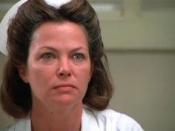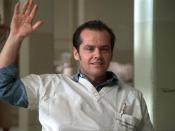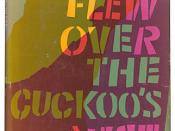"One Flew Over The Cuckoo's nest is a honest yet disturbing approach to viewing human psychology, spirit and the society that we belong to. Within these central themes, the novel also comprises of other views such as the focus on social control and conformity as well as individuality, self expression and a sense of freedom. The tightly run mental asylum of Big Nurse is the abode of these themes and is merely a microcosm to the outside society itself. The patients are stripped of their identity as soon as they enter the complex, and through constant routine and the stringent control of the system, individuality is wiped out and replaced with conformity. The patients are encouraged to no longer have a sense of self expression, where they find it simpler to listen to what the staff orders them to do rather than to act autonomously and maintains the combine's power.
The consequence is that the patients lose their sense of freedom. It is eventually McMurphy's freedom loving individualistic character that impresses on the patients to question the institutions functioning.
Social control is a controversial yet equally important theme in the novel. The institution controls the individuality of the characters and maintains the combine's power. To develop the conformity within the system, the institution manufactures the individualities for the patients. Group therapies are a key example of this situation. Instead of trying to let the patients recover Nurse Ratched is able to fool the patients into fearing individuality. She encourages them to destroy each others individuality by rewarding those who expose the individuality of others and themselves. She reassures the patients that "a guy has to learn to get along in a group before he'll be able to function in a normal society" [Page 43]. By using the power that Nurse Ratched is given from the combine she is able to destroy the natural impulses that make them individual and who they are. Instead the system replaces these impulses with rules and routines that are decisively unnatural. There is however one problem with the systems functioning. It did not account for the raw individuality and charisma of McMurphy and others like him. He shows the patients and in particular Chief Bromden that what other people think or do shouldn't affect the person you are and your individuality. He becomes the counter part of Miss Ratched and she is unable to harness his affects. For every battle he wins he is not able to destroy the combine, but he is at least able to reduce its power. But the one thing remains constant, the combine cannot be destroyed. It is ironic that the individual is a threat to the society which managed to suppress individuality so efficiently.
The patients at the institution are all "frightened, desperate, ineffectual little rabbits" [Page 53]. They are timid and are so accustomed to the system and its regulations that they have almost forgotten about what life would be like outside of it. Once again the Group therapy sessions are a key example. The patients turn against each others "flaws" or expressions of themselves. The nurse encourages them to express themselves, but when they do, the nurse encourages the other patients to "peck at each other like hens at a pecking party" [Page 51]. Hens can commit genocide to themselves when they turn like this, just as McMurphy sees that the patients turn on themselves and destroy each others individuality. Fearful of the questions that will be asked to them when they show their emotions, the patients remain quiet and the patient's self-expression is crushed. When they do speak out for themselves they are afraid that the others will attack them. The system does an extremely efficient task of breaking them down, and once the patients are afraid to express themselves, they become easily manipulated and obey whatever they are ordered to do. They become the perfect members of the conformed institution. They lose their individuality and freedom, and are left with routine and fear which leads to a simple job for Nurse Ratched.
Freedom is a key theme throughout the novel. Without freedom, there can be no individuality, and with no individuality the nurse has a simple task to control conformity. It is ironic that by taking away the patients freedom, Nurse Ratched is able to make them believe that they find it. The patients have been influenced her constant repetition and rules to an extent that they believe that real freedom which can only be found outside of the institution is what takes the freedom away from them. She is able to utilise the powerful instrument of fear to force the patients into believing things. However, McMurphy's uncanny ability to laugh at even the worst of situations soon gives the patients confidence, and once they find confidence McMurphy is able to lead them out into the real world, such as the fishing trip, where they experience life outside of the institution again. After that, it is impossible for them to find freedom once again within the grim walls of the almost prison like institution. With that freedom, comes the powerful force of individuality which when mixed with conformity results in a volatile combination.
The three main themes that are developed in the novel simultaneously affect each other. That is, by focusing on social control and conformity as well as individuality the Nurse Ratched realises that self expression must be reduced or crushed altogether. Instead of breaking it however, she is able to manipulate the patients into fearing it. Once they lose their self expression, they lose their sense of freedom, and once they no longer have their sense of freedom, conformity is inevitable. McMurphy however, is able to change this all. He is able to make an imprint in the lives of each of the patients in his unique way. He shows the patients that individuality is something to be proud of and not something to fear as Nurse Ratched makes them believe. He gives them the courage they need so that they can eventually face the outside world again; he gives them a chance to recover instead of losing their freedom to the institution.


